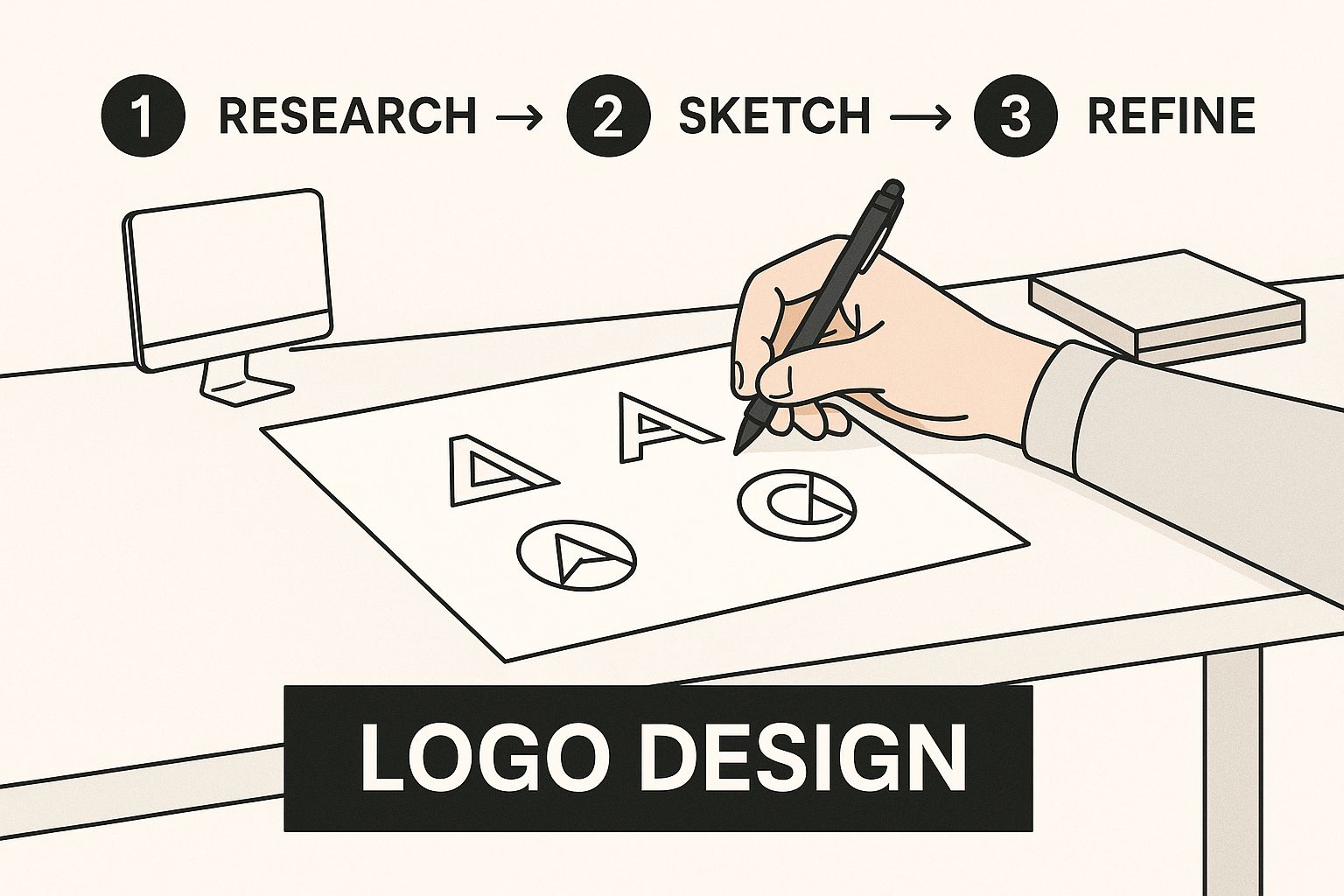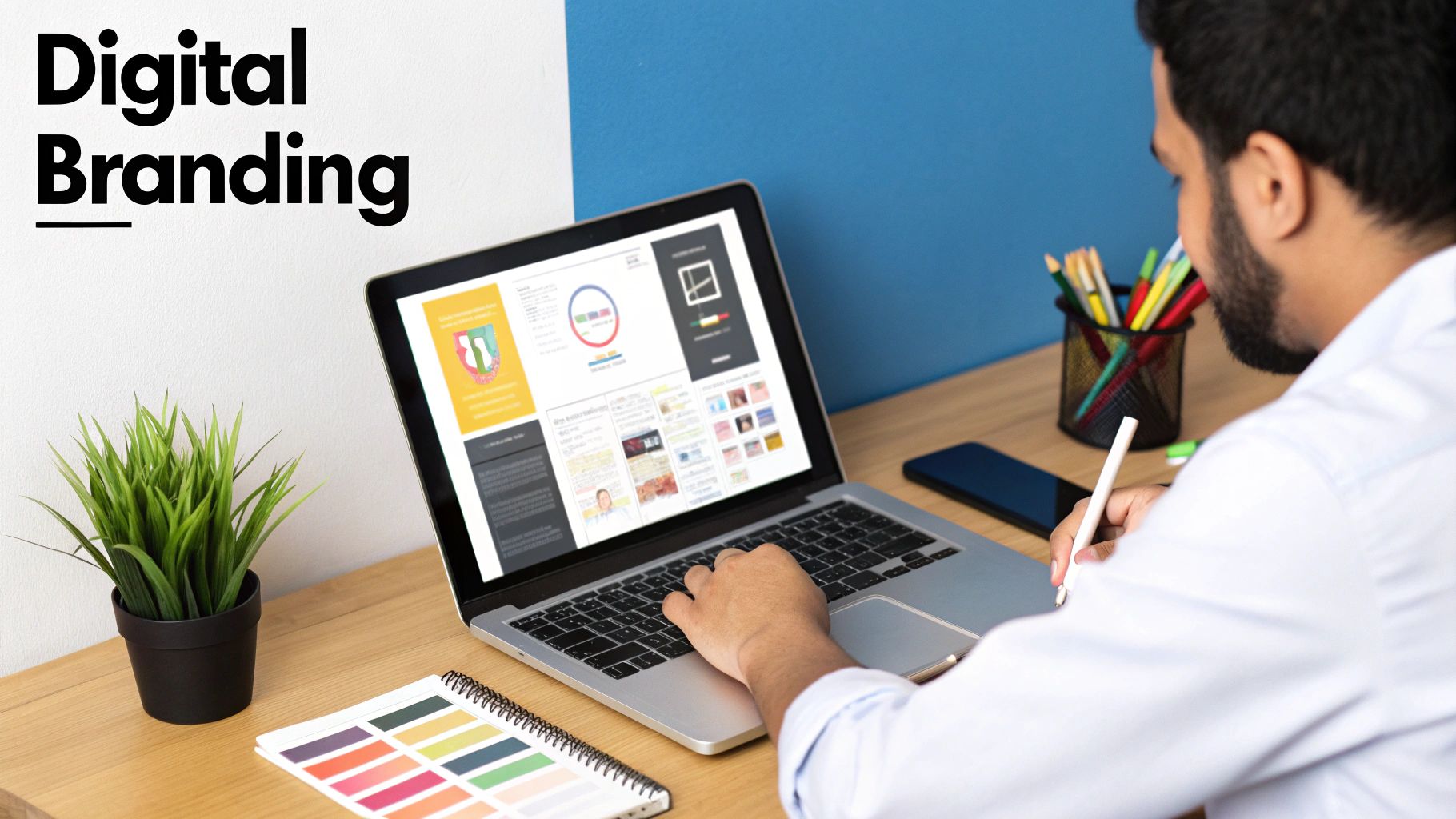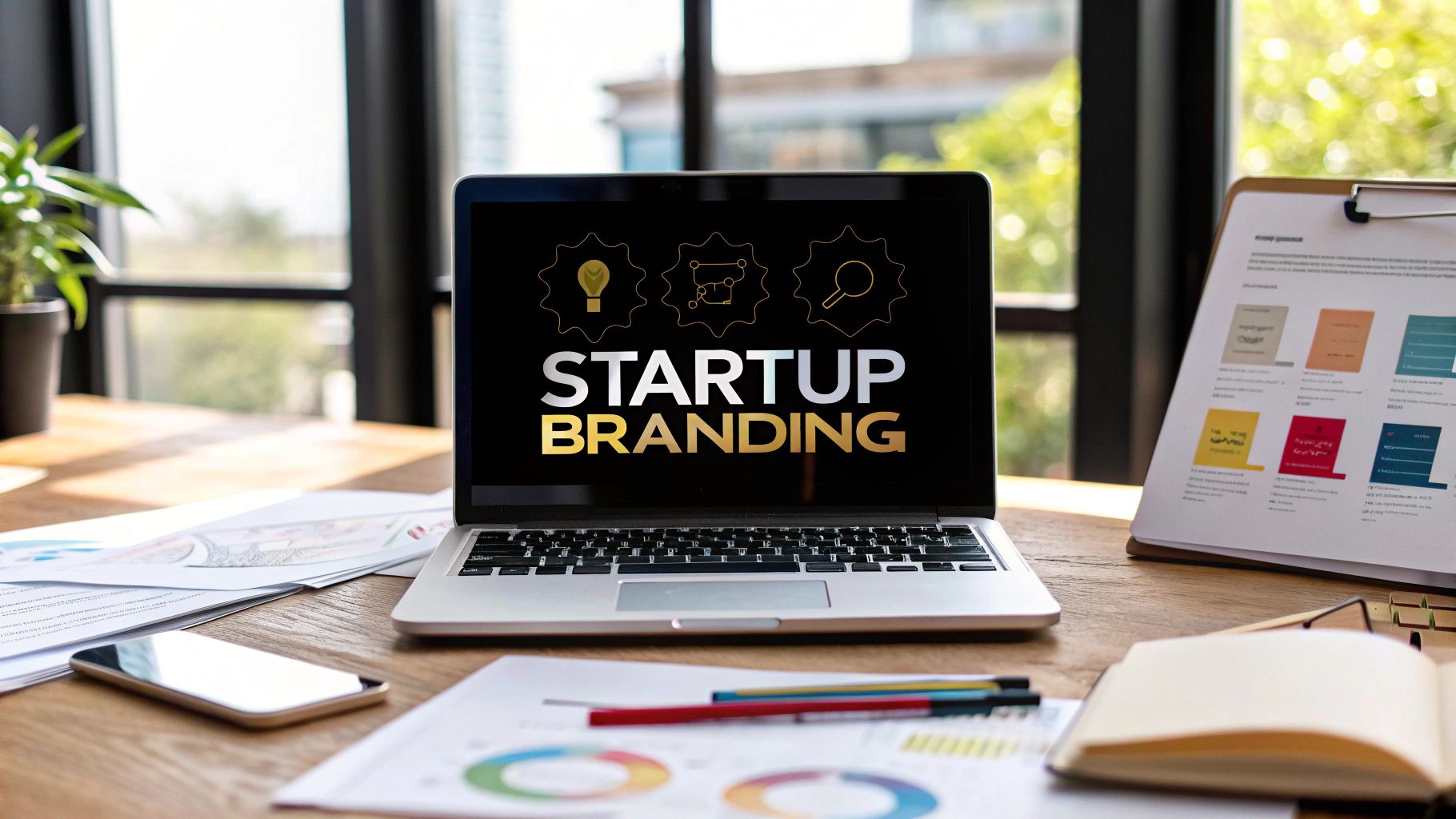Branding is so much more than just getting a cool logo. It's a strategic play that builds trust with your customers, carves out your space in the market, and ultimately drives the long-term value of your business. Think of a strong brand as a core asset, one that helps you get noticed, attract investors, and build a foundation for real, sustainable growth.
Why Smart Branding Is a Startup's Best Investment
Too many founders treat "branding" as a luxury—something they'll get to after the next round of funding. That's a huge mistake. Your brand is the very soul of your business. It shapes everything from how customers see you to how your own team feels about their work. It's the story you're telling the world, and you start telling that story from day one.
A powerful brand makes an instant connection. When you see a logo you recognize or hear a tagline that sticks, you immediately have a set of feelings and expectations tied to it. That's exactly what professional branding services for startups are designed to do. They go beyond the surface level to understand your mission, your vision, and what makes you different, then build an identity that truly speaks to your ideal customer.
The Real Cost of Neglecting Your Brand
Pushing branding to the back burner doesn't save you money—it just kicks the can down the road. Startups that launch with a weak or confusing brand almost always run into the same problems:
- Low Customer Trust: If your identity doesn't look professional and cohesive, potential customers will hesitate. They'll wonder if you're credible.
- Difficulty Standing Out: In a sea of competitors, a generic brand makes you completely invisible.
- Challenges in Fundraising: Investors aren't just funding a product; they're backing a vision. A well-defined brand shows them you have a clear, strategic plan.
A brand is not just a logo, a website, or your business cards. It's an experience. It’s the emotional gut feeling a person has about your product, service, or organization.
There's a reason the demand for professional branding is exploding. The global market for branding agencies is on track to hit USD 90.27 billion by 2033, which shows just how vital a distinct identity has become. Founders are finally getting it.
At the end of the day, investing in your brand is investing in your startup's future. To learn more about building and growing your brand the right way, check out these Top Brand Development Strategies. Getting your brand strategy right from the beginning pays off in customer loyalty, a stronger market position, and the confidence of investors. For even more detailed advice, take a look at our complete guide to branding for startup companies.
Defining Your Needs Before You Hire Anyone

Before you even start Googling agencies or looking at cool portfolios, the most important work needs to happen right inside your own office. I’ve seen it time and again: startups rush out to hire someone with a fuzzy idea of what they want. It’s a classic mistake, like asking a builder to start on your house without any blueprints. You'll just burn through cash and end up with something that doesn’t quite work.
The whole point of doing this homework is to create a focused, actionable brief. Think of this document as your North Star. It’s what will guide every conversation you have and make sure the branding services for startups you end up paying for actually line up with your real business goals. A solid brief helps agencies give you a real quote and proves they actually get what you're trying to build.
Start with Your Core Foundation
Every memorable brand I've ever worked with is built on a simple, solid foundation. Before you get excited about logos or color palettes, you have to be able to explain what your business is all about. This isn't just corporate fluff; it's the soul of your company.
Get your founding team in a room and hammer out the answers to these core questions:
- Mission: Why do you exist, really? What’s your purpose beyond just making a profit?
- Vision: What does the future look like if you succeed? How is the world better because of you?
- Values: What are the non-negotiable principles that guide how you operate every single day?
Getting this stuff on paper is the first strategic layer. For instance, a fintech startup’s mission might be "to make investing accessible to everyone." Their vision could be "a world where financial literacy is universal." Those statements instantly tell you what kind of brand you need—one that feels trustworthy and empowering, not intimidating and complex.
Define Your Unique Position in the Market
Okay, foundation's set. Now, you need to figure out where you fit in. You can't stand out if you don't know what you're standing next to. This part requires some honest self-reflection and a little market snooping.
This is all about your Unique Value Proposition (UVP). It's just a clear, simple statement that explains the benefit you provide, how you solve a customer's problem, and what makes you different from the next guy.
A great little trick for framing your UVP is to finish this sentence: "We help [target customer] to [solve a problem] by [our unique solution]."
This forces you to get specific. "We sell project management software" is forgettable. But "we help freelance creatives manage clients and invoices effortlessly with our all-in-one intuitive platform"—now that has some teeth. That kind of clarity is pure gold for a branding agency.
Create Your Ideal Customer Persona
Last but definitely not least, you have to know exactly who you're talking to. A brand that tries to be for everyone ends up being for no one. Building a detailed customer persona is how you ensure your brand’s voice, tone, and look will actually connect with the right audience.
Don't just stick to the basics. Dig deeper into what makes them tick:
- Goals and Motivations: What are they really trying to achieve in their life or work?
- Challenges and Pain Points: What's getting in their way? What keeps them up at night?
- Communication Preferences: Where do they spend their time online? What blogs, podcasts, or influencers do they follow?
When you finish this internal homework, you’ve turned a vague desire for "branding" into a concrete, strategic plan. You can walk into that first agency meeting with confidence, knowing exactly what you need and ready to build a partnership that will actually get you there.
How to Find and Evaluate Branding Agencies
Okay, you’ve done the internal work and know what you need. Now comes the exciting part: finding an agency that can turn your vision into a reality. The right partner is more than just a vendor; they're a collaborator who gets your market, understands your ambition, and is genuinely invested in your success.
But where do you even start looking?
Casting a wide net is a good first step. Creative platforms like Behance and Dribbble are fantastic for discovering raw visual talent and seeing who's doing innovative work. But don't stop there. The best leads often come from your own network—ask other founders, mentors, or investors for recommendations. A personal referral comes with a built-in layer of trust that you just can't find anywhere else.

As this image shows, great branding isn't a single event. It's a thoughtful, multi-step process that moves from rough ideas to a polished, final design. You're looking for a partner who respects that process.
Look Beyond the Pretty Pictures
A slick portfolio is table stakes. Any decent agency will have one. What you really need to look for is the thinking behind the pretty pictures.
When you're digging into their case studies, look for a clear story. Do they just show you the final logo, or do they walk you through the client's original problem, their process for solving it, and the real-world results they delivered?
I always look for signs of a structured, strategic approach:
- A Real Discovery Phase: Did they talk to customers? Conduct market research? Interview key stakeholders?
- Strategy-Driven Design: Can you see a direct line connecting their creative choices to the client's actual business goals?
- Proof of Impact: Do they mention tangible outcomes? Things like a boost in brand recognition, better user engagement, or even an increase in market share.
A portfolio that’s all sizzle and no steak—just final designs without any context—is a major red flag. It suggests they care more about aesthetics than strategy, and for a startup, that’s a recipe for a beautiful but ineffective brand.
Master the Initial Consultation
That first call with a potential agency is a two-way street. They're sizing you up, and you should be doing the exact same thing. This is your chance to see if the chemistry is right, to understand their communication style, and to figure out if they really get your unique challenges.
Come prepared with questions that dig deeper than, "So, what's your price?"
- "Could you walk me through a similar project? What were the biggest hurdles you had to overcome?"
- "How do you typically handle feedback and revisions when we get into the creative phase?"
- "If we work together, who will be our day-to-day point of contact?"
Pay close attention to how they listen. Are they asking smart, insightful questions about your business, or do they jump straight into a generic sales pitch? The best partners are curious. They want to understand your world before they ever start talking about their own.
Choosing the Right Type of Branding Partner
Not all agencies are created equal. The "best" partner for a Fortune 500 company is likely overkill for a seed-stage startup. Here’s a quick breakdown to help you figure out what kind of partner makes the most sense for you right now.
Ultimately, the goal is to find a partner whose size, expertise, and working style align with your current needs and budget. A freelancer might be perfect for your first logo, but a boutique agency will be better equipped to build out a full brand system as you start to scale.
Remember that first impressions are everything—research shows that 55% of a brand's perception is based on visuals alone. That’s a huge number, and it underscores why finding the right creative partner is so critical. With over 10,000 branding agencies out there, you have a ton of options, so take your time to find the perfect fit.
The right agency doesn't just execute your ideas—they challenge them. They act as a strategic partner, pushing you to think bigger and ensuring the final brand is built on a solid foundation.
At the end of the day, finding the right agency is about finding the right fit. You’re looking for a team that not only has the skills but also the strategic mindset and collaborative spirit to feel like a true extension of your own. Building a solid brand strategy for your startup is a team sport, and picking the right players is the most important first step you'll take.
Talking Money: How to Budget for Branding
Let's get right to it: money. For most startups, figuring out the cost of professional branding is a huge, confusing roadblock. You see prices all over the place, and it's tough to know what's realistic.
Here’s the thing: you aren't just buying a logo. You're investing in a strategic foundation for your entire business. That price tag reflects the deep thinking, the market research, and the creative horsepower required to build a brand that actually grows with you. Trying to cheap out on branding is one of the most common—and costly—mistakes a founder can make. The bargain option is rarely the best value.
How Agencies Bill for Their Work
Once you start asking for quotes, you'll run into a few different ways agencies structure their fees. Each has its place, and the best fit really depends on your project and whether you need help down the road.
You'll most likely see one of these three models:
- Project-Based Fees: This is the standard for branding. You agree on a specific scope of work—say, a full brand identity package—for a single, fixed price. It’s perfect for budgeting because there are no surprises.
- Monthly Retainers: If you need ongoing creative support, a retainer is the way to go. You pay a set fee each month to reserve a block of the agency's time. This works great for creating marketing materials, social media graphics, or just having a team on call after your brand launches.
- Value-Based Pricing: You'll see this with more elite agencies. They price their services based on the tangible value they bring to your business, not just the hours they log. It’s less common for early-stage startups but signals a deep, results-focused partnership.
What Your Budget Actually Buys You
You have to be realistic about what you can spend. While every agency is different, the level of service you get is directly tied to your budget. A small, five-person shop in a suburb won't have the same overhead—or price point—as a 50-person firm in a high-rise.
Don't ever confuse a low price with a good deal. A cheap logo you grab online isn't the same as a strategic brand identity. It won't come with the competitive analysis, market research, or strategic positioning that sets you up for success.
Think of your branding budget as part of your overall growth engine. Right now, about 63% of businesses are spending more on digital marketing, and 72% of marketing budgets are funneled into digital channels. Why? Because it works. A well-executed PPC campaign, for instance, can bring in $2 for every $1 spent. This shows the clear ROI you get from investing in your brand smartly from the start. You can dig into more of these numbers and branding statistics over at Blacksmith.agency.
At the end of the day, your budget should match how important you believe your brand is to your company's future. See it for what it is: a core investment that pays dividends through customer loyalty, a stronger market position, and a real connection with your audience. Resist the urge to hunt for the lowest price and focus instead on finding the best partner and the greatest long-term value.
Making the Client Agency Partnership Work

Choosing an agency feels like a huge win, but it’s really just the beginning of the race. A powerful brand isn't something an agency just hands over; it's something you build together through a focused partnership. Your role is just as crucial as their creative talent.
Success boils down to two things: clear communication and respecting the process. This isn’t a simple transaction. It's a creative journey with distinct phases, and understanding what happens at each stage will save you a ton of headaches and lead to a much better outcome.
The Discovery and Strategy Phase
Before anyone even thinks about opening a design program, the real work begins. The first phase is all about deep listening and getting on the same page. Your agency will kick things off with a discovery session, which is their chance to get under the hood of your business.
They're going to ask some tough questions—about your market, competitors, and where you see the company in five years. They aren't doing this because they didn't read your brief. They’re digging for the insights that will shape a brand that actually works. Your job is to be an open book.
During this stage, you can expect:
- Stakeholder Interviews: They'll want to talk to key people on your team to get a 360-degree view.
- Competitive Analysis: A deep dive into what your competitors are doing, what’s working for them, and where the opportunities are.
- Audience Research: They'll go beyond your existing personas to really understand what makes your customers tick.
This all culminates in a strategic document—often called a brand platform or strategy brief. This becomes the North Star for every creative decision, ensuring that the final brand is built on a solid foundation, not just someone's personal taste.
Creative Development and Feedback Loops
Alright, now for the fun part. With a clear strategy in hand, the creative team starts bringing ideas to life. They might show you mood boards, initial logo concepts, or color palettes. This is often the most exciting and nerve-wracking stage of the whole process.
How you give feedback here is absolutely critical. Vague comments like, "I don't know, I just don't like it," are a dead end. It gives the creative team nothing to go on.
Tie your feedback directly to the strategy we just talked about. Instead of a gut reaction, try saying something like: "This concept feels a bit too corporate, which clashes with our brand pillar of being playful and accessible to a younger audience."
That kind of specific, strategy-driven feedback is pure gold. It respects the creative work while nudging the project back on track. The branding services for startups you invested in are meant to create a strategic asset, and great feedback is how you ensure the final identity aligns perfectly with your goals. The aim is to refine and improve, not to start over with every round of revisions.
Common Questions About Startup Branding
https://www.youtube.com/embed/QnNpDA13xmo
Diving into branding can feel like a lot, especially when you’re already juggling product development, fundraising, and finding your first customers. It’s no surprise that most founders ask the same handful of questions when they first start looking into professional branding help.
Let’s tackle some of the most common ones. Getting clear on these points will help you navigate the process with confidence and avoid some classic startup missteps.
How Much Should a Startup Budget for Branding?
This is the big one, and the honest answer is: it varies. But we can talk about realistic ranges.
A comprehensive branding package from a solid agency—one that covers strategy, messaging, visual identity, and key assets—will typically run anywhere from $10,000 to $50,000, sometimes more. If you're super early stage and just need the essentials, like a professional logo and a basic visual identity system, you might find packages in the $5,000 to $15,000 range.
A quick word of caution: be very skeptical of those "get a logo for $200" deals. Branding is an investment in your company's future, not just a line item expense. Those super-low-cost options almost never include the strategic thinking needed to create a brand that actually connects with customers and can grow with you.
What's the Difference Between Brand, Branding, and Brand Identity?
You'll hear these terms thrown around, and while they sound similar, they're not the same. Nailing the distinction is key to having productive conversations with any agency.
- Brand: Think of this as your company’s reputation. It’s the gut feeling people have when they hear your name. It’s intangible, emotional, and lives in the minds of your audience.
- Branding: This is the action. It’s the strategic process you go through to actively shape that gut feeling. It’s every decision you make, from your mission statement to your social media voice.
- Brand Identity: These are the tangible things you create to express your brand. Your logo, color palette, typography, website design—all the sensory elements that people see and interact with.
So, you use branding (the process) to create a compelling brand identity (the assets) in order to build a powerful brand (the reputation). Understanding this flow is a core part of any strategy for effective branding for startups.
How Long Does a Branding Project Usually Take?
Patience is a virtue here. A full-scale branding project—from the first kickoff meeting to you holding the final brand guidelines in your hand—generally takes somewhere between 8 and 16 weeks.
The final timeline really depends on the project's complexity, the agency's specific workflow, and how decisive your team is with feedback.
A more focused project, like just a logo and style guide, could be quicker—maybe 4 to 6 weeks. But if your project involves in-depth market research and brand strategy workshops, you need to budget more time for the agency to do that foundational work properly.
Before you sign anything, make sure you and the agency are perfectly aligned on the timeline and key project milestones. This simple step prevents so many headaches down the road and keeps everyone moving in the right direction.
Ready to build a brand that stands out? Softriver specializes in delivering custom logos and full brand identities with unmatched speed and quality. Get started today and see how our top 1% design talent can bring your vision to life.







